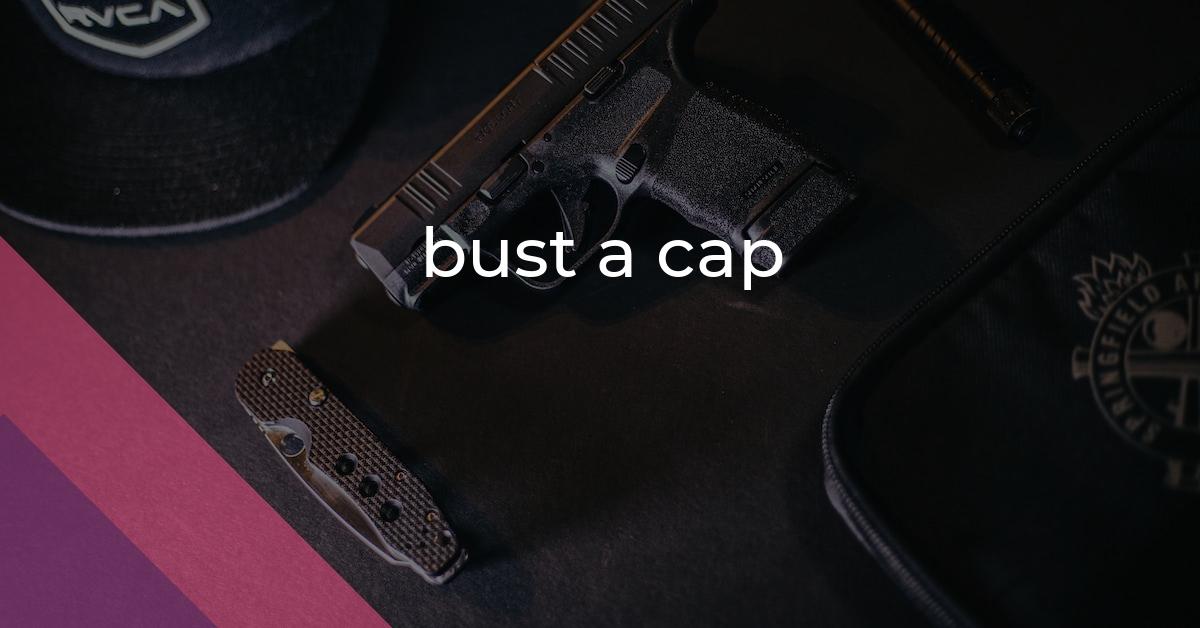bust a cap: Idiom Meaning and Origin
What does ‘bust a cap’ mean?
The idiom "bust a cap" means to shoot someone with a gun. It is often used in slang or informal contexts.

Idiom Explorer
The idiom *shoot 'em up* means an action-packed and violent entertainment, typically a movie or a video game, where there is a lot of shooting and fighting.
The idiom "guns blazing" means to engage in a task or activity with great determination, energy, and enthusiasm.
The idiom "give it the gun" means to apply maximum effort or speed to a task or activity.
The idiom "fire in anger" means to shoot a weapon or discharge ammunition with the intention of causing harm or expressing frustration and hostility.
The idiom "dust off a batter" means to defeat someone easily, especially in a sports or competitive context.
The idiom "drop the bomb" means to reveal or disclose something shocking or important, often causing surprise or chaos.
The idiom "drop a bombshell" means to reveal surprising or shocking news or information that has a powerful and disruptive impact.
The idiom "drop a bomb" means to reveal or disclose a shocking or surprising piece of information or news. It is often used to describe the act of sharing unexpected and significant revelations.
The idiom "crack up" means to burst into uncontrollable laughter or to mentally or emotionally collapse due to stress or pressure.
The idiom "come to blows" means to engage in a physical fight or altercation.
The Evolution of an Expression
Bust a cap is an idiomatic expression that originated in African American Vernacular English (AAVE) and is commonly used in the United States. This idiom is typically used in a colloquial context to mean shooting or firing a gun. The phrase "bust a cap" can be traced back to the early 20th century, where it was first used in African American communities. The term "bust" in this context means to discharge or fire a gun, while "cap" refers to a bullet or a round of ammunition.
The origins of this expression and its exact etymology are not entirely clear, but it is believed to have emerged as a way to convey a sense of toughness or aggression associated with street culture and gang activity. It is important to note that "bust a cap" is primarily used as a figurative expression rather than a literal command to physically shoot someone. It is frequently employed in urban slang and hip-hop culture, where it has been popularized in music, movies, and other forms of media.
One related idiom that is often used in conjunction with "bust a cap" is "bust on". This phrase is also colloquial and informal, and it means to make fun of or criticize someone. When used together, these idioms create a sense of aggressive and confrontational behavior. For example, someone might say "I'm about to bust a cap on you" to indicate that they are going to mock or criticize someone in a harsh manner.
Another related idiom is "blow someone's brains out". This expression is even more explicit in its meaning and refers to shooting someone in the head, resulting in the splattering of brains. While this idiom is much more graphic and violent, it is used in a similar context to "bust a cap" to convey a sense of extreme aggression or anger.
While the specific phrases "bust a cap" and "bust a cap in someone's ass" (which adds emphasis and intensity to the expression) gained momentum in the 1980s and 1990s, the underlying concept of using guns as a symbol of power and dominance can be found throughout history. The idiom is an example of how language evolves and adapts to reflect the cultural and social contexts in which it is used.
It is worth mentioning that the use of "bust a cap" is largely restricted to informal and colloquial settings. Due to its association with violence and crime, the idiom may carry negative connotations and is not appropriate for formal or professional discourse. It is crucial to be aware of the potential impact and implications of using such expressions, as they can perpetuate harmful stereotypes or glorify violence.
While the idiom "bust a cap" is deeply embedded in American vernacular, its usage and understanding may vary across different regions and communities. Language is a dynamic and ever-evolving system, influenced by historical, social, and cultural factors. As society continues to evolve, so too will the idiomatic expressions that reflect and shape our shared experiences. The idiom "bust a cap" serves as a reminder of the complexities and nuances of language, leaving us to ponder the richness and potential pitfalls it presents.
Example usage
The police officer had to bust a cap to stop the armed robber from escaping.
When Johnny heard that his brother was being threatened, he didn't hesitate to bust a cap at the attacker.
The action movie hero always busts a cap in the final showdown to defeat the villain.
More "Violence" idioms



